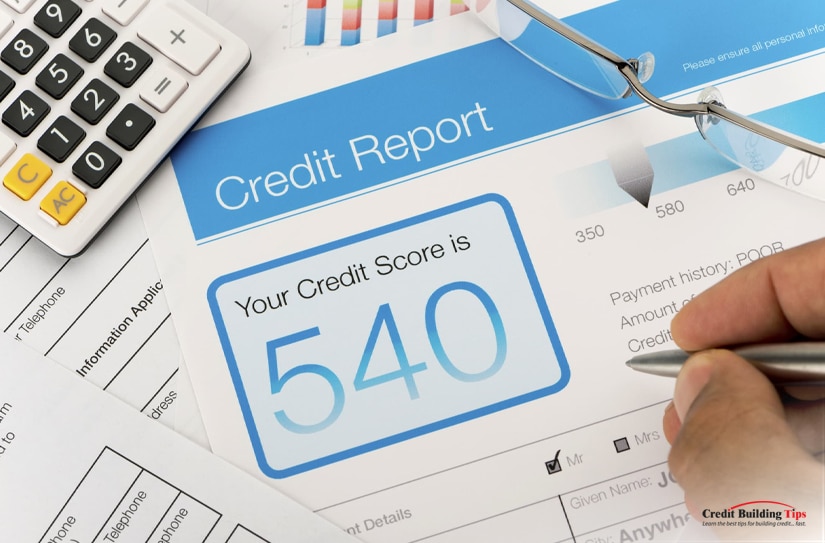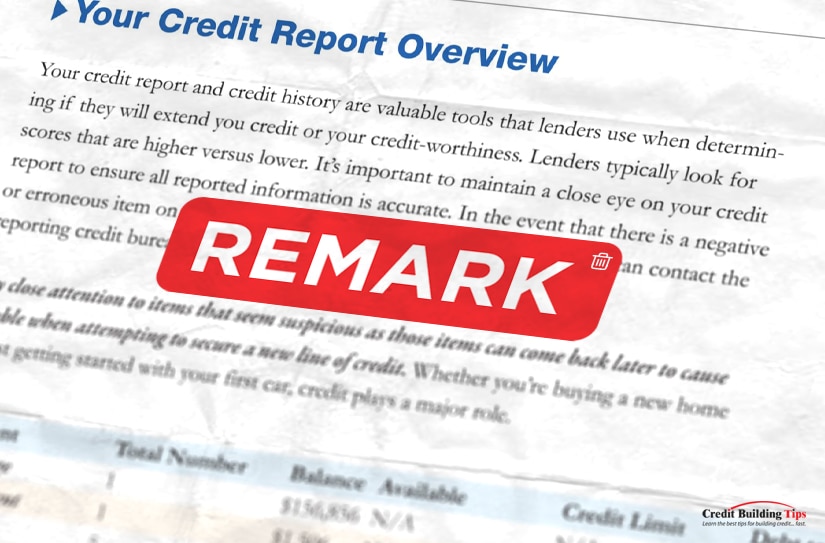You may be wondering what it means when you see a notation on your credit report that says, "remark removed from account." Should you be worried? Is this a good sign?
 This comment in and of itself isn't necessarily either good or bad. It means that a note — or "remark" — has been deleted from your credit file. This note, which could also be a statement or comment, can be attached to your account to explain and give context to anyone authorized to look at your credit report.
This comment in and of itself isn't necessarily either good or bad. It means that a note — or "remark" — has been deleted from your credit file. This note, which could also be a statement or comment, can be attached to your account to explain and give context to anyone authorized to look at your credit report.Remarks (or notes, statements, or comments) don't directly affect your credit score and aren't involved in calculating the score. What the remark refers to can certainly affect your score, but not the remark itself.
In March this year, Nerd Wallet recommended you regularly check your credit information. While the Consumer Financial Protection Bureau suggests checking your credit reports at least once a year, credit expert John Ulzheimer says that checking them once a month is better.

You can get your credit reports for free every week until the end of 2022. Due to the COVID-19 pandemic, Equifax, Experian, and TransUnion are making this offer. You can quickly and easily check your reports at the Annual Credit Report website and also get them over the phone by calling 1-877-322-8228 or by requesting a snail mail copy by writing to:
Annual Credit Report Request Service
PO Box 105281
Atlanta, GA 30348-5281
One of your lenders can add a remark to your credit account to give some more information about your account. Any remark they add and then remove will show this notation. It could be bad, good, or entirely neutral. Knowing you have had a remark removed isn't cause for worry.
At least, not yet.

You can also add a "consumer statement" to your credit report. You'll need to get in touch with the credit reporting agencies and ask for copies of your credit reports. Don't worry that this will negatively impact your credit score.
No matter what you may have heard, Equifax says that checking your credit reports or scores won't impact your credit scores. On the contrary, they report that regularly checking your credit reports and credit scores is an excellent way to make sure the information is accurate.

When you ask for a copy of your credit report or check your score, it's considered a soft inquiry, which doesn't affect your credit score. Other types of soft inquiries happen if a company sends you a promotional credit card offer or an existing lending account gets reviewed by companies you have an account with.
You can see these types of inquiries, and they'll stay on your credit report for 12 to 24 months.
Unlike soft inquiries, hard inquiries do affect your credit score. There are two ways to make a hard inquiry — the first happens when you apply for a credit card. The second is when you apply for a loan and the lender checks out your credit history.

Of course, these types of inquiries are perfectly legitimate, and everyone needs to do them occasionally. If you're buying a home, you'll want to shop around for the best mortgage rates, so you'll contact several lenders. The good news is that when you make multiple inquiries for a single mortgage, they're treated as one single inquiry as long as you don't spread them out over a period that's longer than 45 days.
Before a remark gets removed from your credit account, someone will have added a remark. You may get an alert from your credit-monitoring service that lets you know this has happened. Then again, you may not get a notification of a remark being added which is why it's a good idea to regularly check your reports and scores.

According to Finance Jar, there are several positive reasons why a remark was made on your account:
Some negative reasons why a remark could be made on your account:
Neutral reasons why a remark could be made on your account:
The length of time a remark can stay on your credit report depends on three things:
If you put the remark there yourself, you can ask the credit bureau to take it off whenever you like. Unless you ask for it to be removed, it will stay there for one or two years, but not forever.

If a lender added the remark to your report, it would stay there for a specific amount of time depending on the type of remark:
Any unpaid credit card debt will disappear from an individual's credit report after 7 years. After this, any late payments associated with the unpaid debt won't affect your credit score. If a creditor chooses to sue, the case will be thrown out if you can prove that the debt is time-barred.
While remarks can be added to your credit report for good, bad, or neutral reasons, remarks are usually removed for positive or neutral reasons. There aren't really situations where a remark will be removed for a negative reason, as these types of remarks usually remain until the situation is resolved.

If you get an alert or you see that a remark has been removed when you check your report, it could mean that a payment status has changed, a credit dispute has been resolved, or an account has been deleted.
As you may have reason to know, credit bureaus can make mistakes. The Federal Trade Union commissioned a study of the US credit-reporting industry and found that as much as five percent of consumers had inaccurate reporting on at least one of their three major credit reports.
The study also reported that:
"One in four consumers found errors on their credit reports that could affect their credit scores.
One in five consumers found an error that was corrected by a credit reporting agency (CRA) after it was disputed.
Four out of five consumers who filed disputes experienced a modification to their credit report.
Slightly more than one in 10 consumers saw a change in their credit score after the CRAs modified errors on their credit reports.
Approximately one in 20 consumers had a maximum score change of more than 25 points.
Only one in 250 consumers had a maximum score change of more than 100 points.This FTC report is the first major study that looked at all the primary groups that participate in the credit reporting and scoring process:
Consumers
Lenders/data furnishers (including creditors, lenders, debt collection agencies, and the court system)
The Fair Isaac Corporation, which develops FICO credit scores
National credit reporting agencies (CRAs).It was conducted with 1,001 participants who reviewed 2,968 credit reports with a study associate who helped them identify and correct possible errors on their credit reports."
 If you file a dispute on your credit report, an investigation will be opened on your account. You should expect to hear the results of this investigation within 30 days. And if the information is found to be wrong or incomplete, your report should be updated within about 30 days.
If you file a dispute on your credit report, an investigation will be opened on your account. You should expect to hear the results of this investigation within 30 days. And if the information is found to be wrong or incomplete, your report should be updated within about 30 days.The act of adding a remark to dispute a charge on your credit score doesn't affect your score. It's the outcome of the dispute investigation that determines whether your credit score will take a hit.

Once you file a dispute, the Fair Credit Report Act requires the credit reporting agency to place an "XB" code on the item in question. This code stands for "Compliance Condition Code" and means consumer disputes and an investigation is in process.
When a potential lender sees that code on your account, they know a dispute is being actively investigated by the credit reporting agency. The impact of this is that the FICO score won't allow an item that is being disputed to harm your score.
Basically, they don't allow a disputed item to be considered when calculating your credit score. But if you are trying to qualify for a mortgage, most lenders won't consider your application until any disputes are resolved.
Lenders require every single dispute comment, unless it's a medical account, to be removed before they approve a home loan. This may be due to an automatic flag that gets raised with their automated underwriting system.
A more important reason why lenders can't disregard a disputed remark is that the remark changes the way your credit score is calculated. Most home loans are long-term, and it's simply too risky for the lenders not to see your true credit score, both positive and negative aspects.
Usually, these denials can be dealt with before you lose your opportunity to purchase your new home. The dispute needs to be taken care of, and you might need to write an explanatory letter before your credit can get re-pulled by the bank or mortgage agency.
If you're right or wrong about the dispute, your credit score might dip once a decision has been made. This has more to do with the impact of the removal of the XB code than with whether the dispute was judged to be accurate or inaccurate.
If the remark on your account is there for a positive or neutral reason, it doesn't make sense to spend time trying to remove it, especially as it's clear that your credit score isn't impacted or affected by the remark itself.
Where it might be worth trying to remove a remark from your account is when it's there for a negative reason. Even if you've been able to resolve why you received a negative remark in the first place, the remarks will still stay on your report until they age off.
Negative remarks will alert other potential lenders to any credit troubles you've had in the past. If you can, speak to a live agent and explain your situation and why it's important to get a remark removed in a timely fashion.

FAQ Blog suggests the following six steps to remove negative remarks from your credit report:
I'm passionate about the credit-scoring system and know how important your credit score is. And that's why I'm here every week, helping you understand what's at stake and how to take advantage of the system to improve your credit scores as fast as possible.